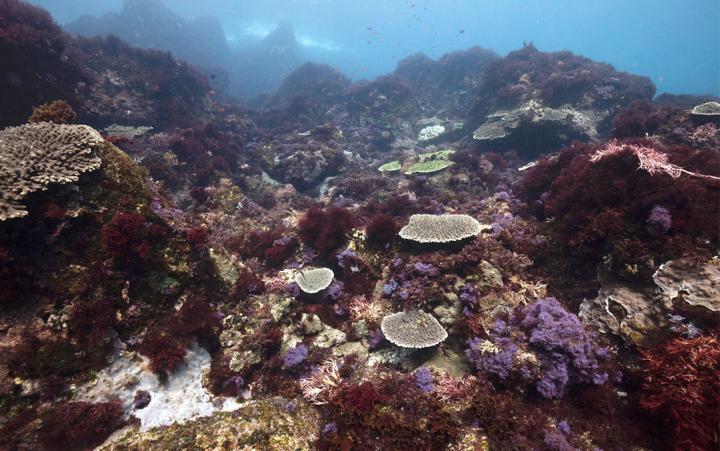Researchers from the University of Tsukuba find that ocean warming and acidification are shifting temperate coastal reefs to simple turf-dominated ecosystems

Credit: University of Tsukuba
Shizuoka, Japan – At Shikine Island, Japan, kelp forests and abalone fisheries were once common, but over the last twenty years they have disappeared. Now, researchers from Japan have discovered that these temperate coastal marine ecosystems are becoming more “simple”, losing biodiversity, complexity and their aesthetic values.
In a study published this month, researchers from the University of Tsukuba and international collaborators explored how the combined effects of ocean warming and acidification are changing temperate coastal marine ecosystems.
Tropical coastal seas are synonymous with coral reefs. As ocean temperatures cool toward the poles, corals give way to kelp as the main habitat-forming species. The shift from coral to kelp can clearly be seen along the 2000 km coastline of Japan, and changes to these ecosystems are already underway.
“Kelp forests are being lost globally as a result of warmer sea surface temperatures and heatwaves,” says lead author, Dr Sylvain Agostini. “In Japan, this “isoyake”, or “burnt seashore”, is widespread. As ocean temperatures continue to increase, warm water corals are shifting northward into temperate reefs and could replace cold-water species.”
There are three possible scenarios as coastal species shift. Temperate reefs could become more tropicalized and dominated by warm water corals, fishes, and other species. Alternatively, reefs may become dominated by tropical seaweeds or turf algae.
But another effect of increasing greenhouse gas emissions–ocean acidification–complicates matters. Acidification reduces the amount of carbonate in the ocean, which is needed by reef-building corals to create their structure. Decreases in carbonate ion concentrations could limit the colonization of new areas by fast-growing coral species.
To examine possible changes along the coast of Japan, the team used three locations at a similar latitude that represent three different scenarios (present, ocean warming, and ocean warming plus acidification). They examined the existing communities, and then transplanted kelp and coral species and measured their growth and survival at the different sites.
The team found that with both ocean warming and acidification, coastal ecosystems are likely to lose kelp forests but may not gain reef-building corals. The result is a simplified turf-dominated habitat.
“Warmer waters facilitate the growth and colonization of reef-building corals,” explains Dr Ben Harvey. “But ocean acidification appears to negate these benefits. And kelp transplants did not survive in warmer waters, largely because they were eaten by warm water fishes.”
“The consequences of these changes is that warm temperate coastal waters are facing major simplification which is clearly seen in the degradation of the seascape” as noted and documented by Prof. Nicolas Floc’h, co-author of the study and artist at the Ecole Européenne Supérieure d’Art de Bretagne. Lost kelp forests are likely to be replaced by simpler turf-dominated communities that provide a fraction of the ecosystem services of more biodiverse tropical reefs. Overall, the results highlight the urgent need for control of carbon emissions and limit the drivers of ocean change.
###
The article, “Simplification, not ‘tropicalization’, of temperate marine ecosystems under ocean warming and acidification,” was published in Global Change Biology at DOI: 10.1111/gcb.15455.
Media Contact
Naoko Yamashina
[email protected]
Related Journal Article
http://dx.




